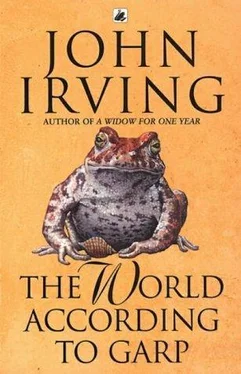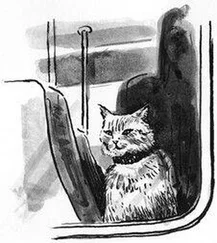Mrs. Ralph laughed bitterly. “My husband found a nineteen-year-old cunt ,” she said. “He seems to want her .”
“I'm sorry,” Garp told her. The marriage counselor is the I'm-sorry man, like a doctor with bad luck—the one who gets to diagnose all the terminal cases.
“You're a writer,” Mrs. Ralph said to him, accusingly; she waved her copy of The Eternal Husband at him. “What do you think of this?”
“It's a wonderful story,” Garp said. It was fortunately a book he remembered—neatly complicated, full of perverse and human contradiction.
“I think it's a sick story,” Mrs. Ralph told him. “I'd like to know what's so special about Dostoevsky.”
“Well,” Garp said, “his characters are so complex, psychologically and emotionally; and the situations are so ambiguous.”
“His women are less than objects,” Mrs. Ralph said, “they don't even have any shape . They're just ideas that men talk about and play with.” She threw the book out the window at Garp; it hit his chest and fell by the curb. She clenched her fists in her lap, staring at the stain on her dress, which marked her crotch with a tomato-sauce bull's-eye. “Boy, that's me all over,” she said, staring at the spot.
“I'm sorry,” Garp said again. “It may leave a permanent stain.”
“Everything leaves a stain!” Mrs. Ralph cried out. A laughter so witless escaped her that it frightened Garp. He didn't say anything and she said to him, “I'll bet you think that all I need is a good lay .”
To be fair, Garp rarely thought this of people, but when Mrs. Ralph mentioned it, he did think that, in her case, this oversimple solution might apply.
“And I'll bet you think I'd let you do it,” she said, glaring at him. Garp, in fact, did think so.
“No, I don't think you would,” he said.
“Yes, you think I would love to,” Mrs. Ralph said.
Garp hung his head. “No,” he said.
“Well, in your case,” she said, “I just might .” He looked at her and she gave him an evil grin. “It might make you a little less smug,” she told him.
“You don't know me well enough to talk to me like this,” Garp said.
“I know that you're smug ,” Mrs. Ralph said. “You think you're so superior.” True, Garp knew; he was superior. He would make a lousy marriage counselor, he now knew.
“Please drive carefully,” Garp said; he pushed himself away from her car. “If there's anything I can do, please call.”
“Like if I need a good lover ?” Mrs. Ralph asked him, nastily.
“No, not that,” Garp said.
“Why did you stop me?” she asked him.
“Because I thought you were driving too fast,” he said.
“I think you're a pompous fart,” she told him.
“I think you're an irresponsible slob,” Garp told her. She cried out as if she were stabbed.
“Look, I'm sorry,” he said (again), “but I'll just come pick up Duncan.”
“No, please ,” she said. “I can look after him, I really want to. He'll be all right—I'll look after him like he was my own!” This didn't truly comfort Garp. “I'm not that much of a slob—with kids ,” she added; she managed an alarmingly attractive smile.
“I'm sorry,” Garp said—his litany.
“So am I,” said Mrs. Ralph. As if the matter were resolved between them, she started her car and drove past the stop sign and through the intersection without looking. She drove away—slowly, but more or less in the middle of the road—and Garp waved his wooden spoon after her.
Then he picked up The Eternal Husband and walked home.
10. THE DOG IN THE ALLEY, THE CHILD IN THE SKY
WE'VE got to get Duncan out of that mad woman's house,” Garp told Helen.
“Well, you do it,” Helen said. “You're the one who's worried.”
“You should have seen how she drove,” Garp said.
“Well,” said Helen, “presumably Duncan isn't going to be riding around with her.”
“She may take the boys out for a pizza,” Garp said. “I'm sure she can't cook.”
Helen was looking at The Eternal Husband . She said, “It's a strange book for a woman to give to another woman's husband.”
“She didn't give it to me, Helen. She threw it at me.”
“It's a wonderful story,” Helen said.
“She said it was just sick ,” Garp said, despairingly. “She thought it was unfair to women.”
Helen looked puzzled. “I wouldn't say that was even an issue,” she said.
“Of course it isn't!” Garp yelled. “This woman is an idiot! My mother would love her.”
“Oh, poor Jenny,” Helen said. “Don't start on her.”
“Finish your pasta, Walt,” Garp said.
“Up your wazoo,” Walt said.
“Nice talk,” Garp said. “Walt, I don't have a wazoo.”
“Yes, you do,” Walt said.
“He doesn't know what it means,” Helen said. “I'm not sure what it means, either.”
“Five years old,” Garp said. “It's not nice to say that to people,” Garp told Walt.
“He heard it from Duncan, I'm sure,” Helen said.
“Well, Duncan gets it from Ralph,” Garp said, “who no doubt gets it from his goddamn mother!”
“Watch your own language,” Helen said. “Walt could as easily have gotten his “wazoo” from you.”
“Not from me, he couldn't have,” Garp declared. “ I'm not sure what it means, either. I never use that word.”
“You use plenty just like it,” Helen said.
“Walt, eat your pasta,” Garp said.
“Calm down,” Helen said.
Garp eyed Walt's uneaten pasta as if it were a personal insult. “Why do I bother?” he said. “The child eats nothing.”
They finished their meal in silence. Helen knew Garp was thinking up a story to tell Walt after dinner. She knew Garp did this to calm himself whenever he was worried about the children—as if the act of imagining a good story for children was a way to keep children safe forever.
With the children Garp was instinctively generous, loyal as an animal, the most affectionate of fathers; he understood Duncan and Walt deeply and separately. Yet, Helen felt sure, he saw nothing of how his anxiety for the children made the children anxious—tense, even immature. On the one hand he treated them as grown ups, but on the other hand he was so protective of them that he was not allowing them to grow up. He did not accept that Duncan was ten, that Walt was five; sometimes the children seemed fixed, as three-year-olds, in his mind.
Helen listened to the story Garp made up for Walt with her usual interest and concern. Like many of the stories Garp told the children, it began as a story for the children and ended up as a story Garp seemed to have made up for Garp. You would think that the children of a writer would have more stories read to them than other children, but Garp preferred that his children listen only to his stories.
“There was a dog,” Garp said.
“What kind of dog?” said Walt.
“A big German shepherd dog,” said Garp.
“What was his name?” Walt asked.
“He didn't have a name,” Garp said. “He lived in a city in Germany, after the war.”
“What war?” said Walt.
“World War II,” Garp said.
“Oh sure,” Walt said.
“The dog had been in the war,” Garp said. “He had been a guard dog, so he was very fierce and very smart.”
“Very mean ,” said Walt.
“No,” Garp said, “he wasn't mean and he wasn't nice, or sometimes he was both. He was whatever his master trained him to be, because he was trained to do whatever his master told him to do.”
Читать дальше












